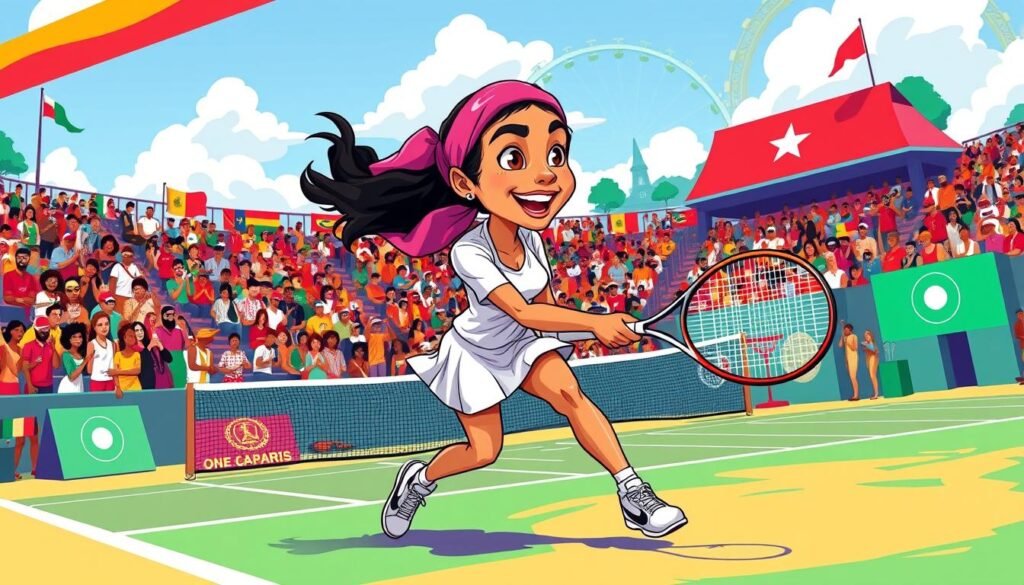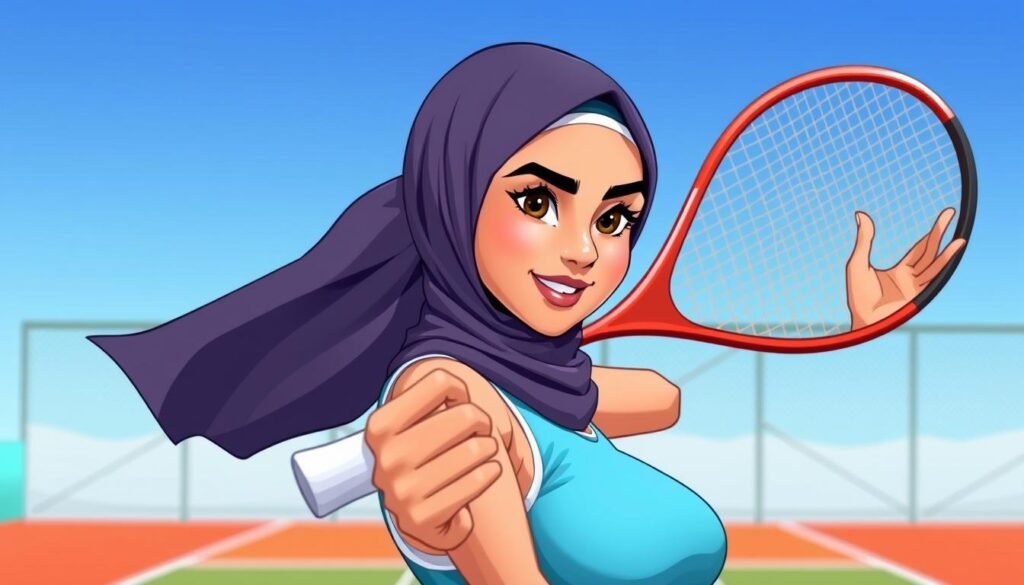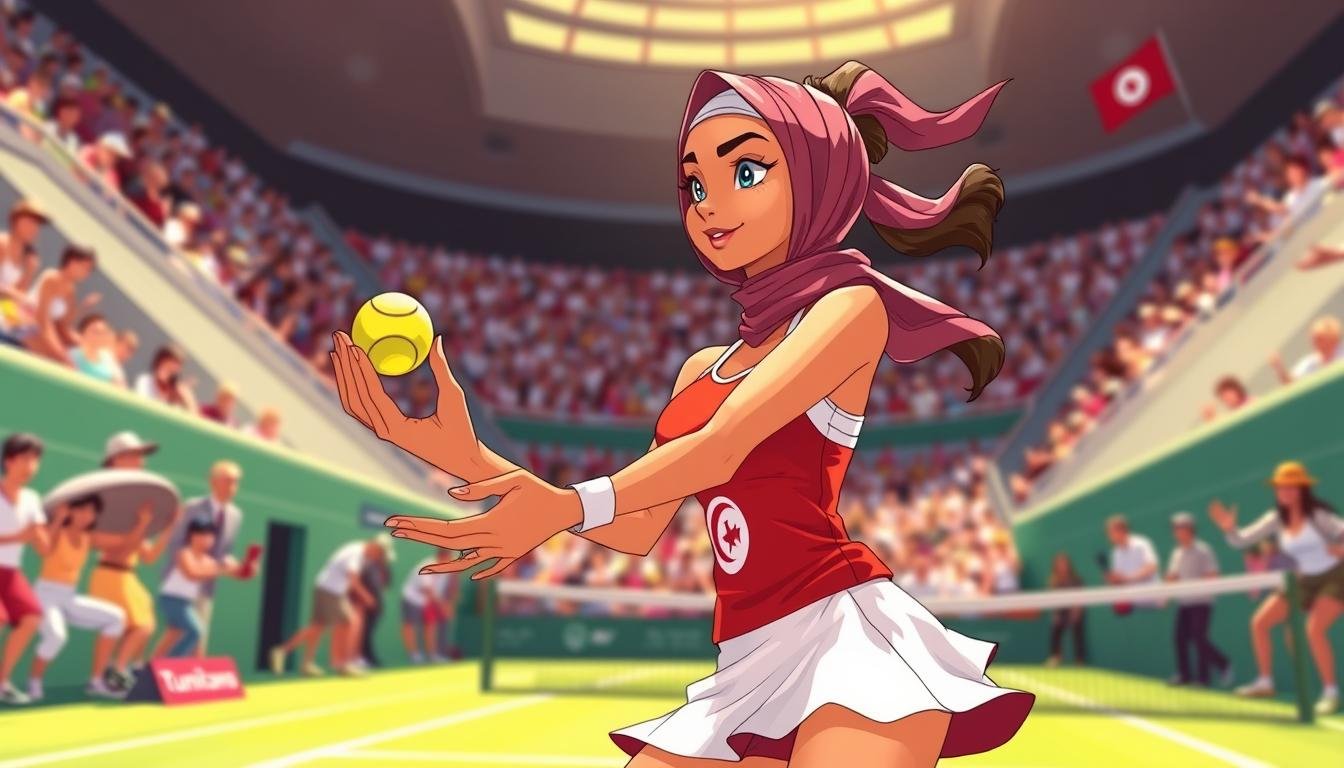Can a professional athlete balance faith with the fierce competition of elite sports? Ons Jabeur’s life answers this question. She is a groundbreaking Tunisian tennis player. Jabeur has changed women’s tennis and become a symbol for Muslim athletes.
She has achieved great things, like being the highest-ranked Arab player. She also reached the finals of major tournaments. Jabeur shows how one can be true to their faith in sports.
We will look at how her career and beliefs intersect. Her heritage and faith shape her journey as an athlete. Let’s explore Ons Jabeur’s identity, from her early days to her impact on sports and her community.
Background of Ons Jabeur
Ons Jabeur, a famous Tunisian tennis player, was born on August 28, 1994, in Ksar Hellal, Tunisia. She grew up in Sousse, where sports were a big part of her family. Her mother helped her start playing tennis, sparking her love for the game.
Jabeur has two older brothers and one older sister. This family environment was full of support for her tennis dreams.
She turned pro in 2010, starting her journey in tennis history. She trained hard in Tunisia, Belgium, and France. By June 2022, she reached World No. 2 in the Women’s Tennis Association (WTA) rankings.
Her win at the WTA 1000 Madrid Open in 2022 was a big deal. It made her the first Arab player to win such a title.
She has made big strides in tennis, like winning the junior French Open in 2011. This achievement is a big deal for athletes in her region. On grass courts, she has a winning percentage of 74%, showing her skill at Wimbledon.
Ons Jabeur’s background is a mix of cultural pride and athletic success. She is a key figure in tennis history.
Early Life and Family Influences
Ons Jabeur started playing tennis when she was just three years old. Her mother introduced her to childhood tennis. This early start helped her love the sport and set her up for success.
The Ons Jabeur family showed great dedication. They made many sacrifices, especially her mother. She worked hard to give Jabeur the chance to train and compete in Tunisia.
The family’s love for tennis really shaped Jabeur’s career. Moving to Tunis gave her better training and coaches. This support was key in making her a star in tennis.
Tennis Career Overview
Ons Jabeur started her tennis career in 2010. It was the beginning of a journey filled with hard work and skill. She quickly became a big name in women’s tennis, earning many WTA achievements.
Jabeur’s hard work paid off when she reached No. 2 in June 2022. This was a big moment for her and Tunisia.
She has achieved many professional milestones in her career. Jabeur won five WTA singles titles and made it to 13 finals. She is especially good on clay courts, winning about 62% of her singles matches.
Her win at the Madrid Open in 2022 was a historic moment. It made her the first Arab or African woman to win a WTA 1000 event.
Jabeur has played in all the big tournaments. She has impressive win percentages: 53% at the Australian Open, 70% at the French Open, 73% at Wimbledon, and 67% at the US Open. In 2022, she reached the finals at Wimbledon and the US Open, becoming the first Arab woman to do so.
Jabeur has also played in three Olympic Games. Her achievements and dedication make her a role model for many. The future looks bright for Ons Jabeur as she continues to inspire others.

Achievements and Rankings
Ons Jabeur is a shining star in women’s tennis. She has made a big impact in the Arab world and beyond. Her journey through tennis rankings shows her skill and determination. She is now the No. 5 player in the world, reaching as high as No. 2 before.
Her achievements are huge, especially winning the Madrid Open in May 2022. This was a first for an Arab and African woman. It showed she can succeed in a sport mostly dominated by others.
Ons Jabeur has won five WTA titles and reached three Grand Slam finals. She has shone at Wimbledon and the U.S. Open. Her success is inspiring many young athletes in Africa.
Off the court, Jabeur is also a big success. She made $6.5 million in 2022, with $1.5 million from endorsements. This shows her value in sports marketing. Her success opens doors for others in Africa.
As a Muslim, Jabeur stays true to her faith. She is a role model for Muslims in sports. People admire her talent and her commitment to being real.
Religious Influences on Sports
Religion and sports mix in a way that shapes athletes’ lives. Ons Jabeur, a Muslim woman athlete, shows how faith and sports meet. She faces challenges in the tennis world while staying true to her Islamic beliefs.
Muslim women athletes deal with big hurdles. These come from society’s views and media. Jabeur’s success helps change these views, showing what Muslim women can do in sports.
Jabeur’s achievements are more than just wins. She’s a role model for young Muslim girls. Her story shows how faith and sports can go together, inspiring others.
Is Ons Jabeur Muslim?
Ons Jabeur is proud to be Muslim. This faith is a big part of who she is. It also shapes her career and how she sees the world.
Her Tunisian roots deeply influence her. She shows the world what it means to be a Muslim woman in sports. Jabeur believes in the power of cultural representation.
Her Tunisian Heritage and Cultural Impact
Ons Jabeur was born in Tunisia. Her roots give her strength and inspire her to succeed. Her story is a beautiful part of Tunisian heritage.
Every win is not just hers. It’s a victory for those who share her background. Jabeur’s success in tennis shows the world what it means to be Tunisian.
She has made it to three Grand Slam finals. Her journey highlights the values of her family and community. Jabeur’s story is one of pride and perseverance.
Public Statements and Beliefs
Ons Jabeur proudly represents her Muslim faith. She thanks her Muslim friends and the community for their support. Her faith gives her the drive to succeed.
Jabeur’s faith is real and guides her. She shows the world what it means to be a Muslim athlete. Her story inspires many.

Representation of Muslim Women in Sports
Ons Jabeur is a shining example of Muslim women in sports. She has broken barriers and inspired many. Her journey to becoming No. 7 in the WTA shows how perceptions are changing.
Historically, few women from northern Africa reached such heights. Jabeur’s success is a big deal.
Female Muslim athletes face many challenges. They often face discouragement and lack of support. Athletes like Ibtihaj Muhammad and Inés Boubakri are changing this.
They show that Muslim women can succeed in sports. Their stories inspire others.
Across the world, Muslim women are becoming more involved in sports. In South Asia, ASEAN, and West Asia, women’s football championships are growing. Countries like Pakistan and Bangladesh are doing well in cricket.
Women’s sports are becoming more than just a dream. It’s becoming a reality for many.
Media Coverage and Public Perception
Ons Jabeur’s story in the media changes how people see Muslim women in sports. She’s the first Arab woman in a Grand Slam final and the second-best in Women’s Tennis Association. Her wins mean a lot to groups fighting for their voices to be heard.
Her media coverage shows her amazing skills and the tough times Muslim female athletes face. It starts a big talk about being included and diverse in sports.
Inspiration to Young Athletes
Ons Jabeur is a symbol of hope and strength for young athletes everywhere. She shows them it’s possible to break barriers and defy sports stereotypes. Her success tells young athletes they can reach the top, no matter their background.
Her journey proves that with hard work and never giving up, you can beat any obstacle. This message not only changes how people see Muslim women in sports. It also pushes young athletes to chase their dreams without fear.
Jabeur’s Approach to Fasting During Competitions
Fasting during Ramadan is tough for athletes, especially top players like Ons Jabeur. They must balance their faith and sports performance. Jabeur shows her dedication by fasting while playing tennis.
Many Muslim athletes face the same challenges. They try to find ways to manage their fasting and sports schedules.
Experiences During Ramadan
For Ons Jabeur, Ramadan is a time for spiritual growth. She plans her energy levels carefully, especially for practice and matches. Adjusting to fasting is hard, but Jabeur has found ways to cope.
Her approach shows it’s possible to follow your faith and compete at the same time. This inspires other Muslim athletes.
Support from Muslim Communities
Ons Jabeur shows us hope and strength. She proves how important Muslim community support is in her journey. As a Tunisian tennis star, she stands for more than just winning games. She represents the bond of her community.
This support helps her push through tough times. It lets her overcome barriers in a world often seen through Western eyes.
The bond between Jabeur and her fans is deep. It shows the value of cultural support in the Muslim world. Fans cheer her on through social media, local events, and worldwide support. This network boosts her spirit and shows that success in sports is a team effort.
Jabeur’s success is a dream for many Muslim athletes. She carries her culture’s pride on the world stage. Her dedication inspires others, linking sports, faith, and community identity.
Future Prospects and Upcoming Challenges
Ons Jabeur’s future in tennis is exciting. She has faced many challenges, including a shoulder injury. This injury might actually help her come back stronger.
Rest is key for a successful comeback. It shows that perseverance is important, not just for athletes but for everyone. It inspires people to overcome their own challenges.
Jabeur is looking forward to the 2025 Mubadala Abu Dhabi Open. It will feature 28 top singles players and 16 doubles pairs. Despite her injuries, she remains competitive.
Her determination is clear. She’s a role model for young Muslim athletes. Her presence at events like the WTA Finals in Riyadh shows her impact.
Ons Jabeur wants to be true to herself while competing. She’s working with Saudi Arabia’s Kayanee on health and personal growth. Her journey shows her resilience and commitment to excellence.
What will Ons Jabeur achieve next? Her future is full of possibilities.
FAQ
Is Ons Jabeur Muslim?
What is the background of Ons Jabeur?
How did early life and family influence Ons Jabeur?
What should I know about Ons Jabeur’s tennis career?
What achievements and rankings does Ons Jabeur hold?
How does religion influence sport, particularly for Muslim women like Ons Jabeur?
What are Jabeur’s views on her Tunisian heritage and cultural representation?
How is Ons Jabeur changing the representation of Muslim women in sports?
How does media coverage affect public perception of Ons Jabeur?
What is Jabeur’s experience like during Ramadan while competing?
How does the Muslim community support Ons Jabeur?
What are the future prospects and challenges for Ons Jabeur?

Embracing Faith, One Insight at a Time!
The teachings of the Quran have always guided my path. With a deep passion for Islamic knowledge, I strive to blend the wisdom of tradition with the relevance of today, making the timeless messages of Islam accessible and meaningful for everyone.
Muslim Culture Hub is my platform to share historical insights and thought-provoking articles, exploring both well-known and lesser-discussed aspects of Islamic culture and beliefs. My mission is to create an inclusive online space where everyone can learn, strengthen their faith, and connect with the profound message of Islam.
Join the journey!
May peace be upon you.









